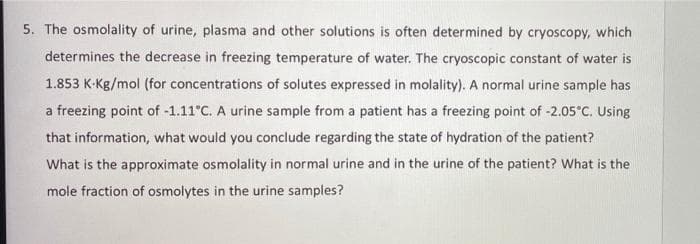The osmolality of urine, plasma and other solutions is often determined by cryoscopy, which determines the decrease in freezing temperature of water. The cryoscopic constant of water is 1.853 K-Kg/mol (for concentrations of solutes expressed in molality). A normal urine sample has a freezing point of -1.11'C. A urine sample from a patient has a freezing point of -2.05°C. Using that information, what would you conclude regarding the state of hydration of the patient? What is the approximate osmolality in normal urine and in the urine of the patient? What is the mole fraction of osmolytes in the urine samples?
The osmolality of urine, plasma and other solutions is often determined by cryoscopy, which determines the decrease in freezing temperature of water. The cryoscopic constant of water is 1.853 K-Kg/mol (for concentrations of solutes expressed in molality). A normal urine sample has a freezing point of -1.11'C. A urine sample from a patient has a freezing point of -2.05°C. Using that information, what would you conclude regarding the state of hydration of the patient? What is the approximate osmolality in normal urine and in the urine of the patient? What is the mole fraction of osmolytes in the urine samples?
General Chemistry - Standalone book (MindTap Course List)
11th Edition
ISBN:9781305580343
Author:Steven D. Gammon, Ebbing, Darrell Ebbing, Steven D., Darrell; Gammon, Darrell Ebbing; Steven D. Gammon, Darrell D.; Gammon, Ebbing; Steven D. Gammon; Darrell
Publisher:Steven D. Gammon, Ebbing, Darrell Ebbing, Steven D., Darrell; Gammon, Darrell Ebbing; Steven D. Gammon, Darrell D.; Gammon, Ebbing; Steven D. Gammon; Darrell
Chapter12: Solutions
Section: Chapter Questions
Problem 12.26QP: Equal numbers of moles of two soluble, substances, substance A and substance B, are placed into...
Related questions
Question
I need hand written solution only

Transcribed Image Text:5. The osmolality of urine, plasma and other solutions is often determined by cryoscopy, which
determines the decrease in freezing temperature of water. The cryoscopic constant of water is
1.853 K-Kg/mol (for concentrations of solutes expressed in molality). A normal urine sample has
a freezing point of -1.11°C. A urine sample from a patient has a freezing point of -2.05°C. Using
that information, what would you conclude regarding the state of hydration of the patient?
What is the approximate osmolality in normal urine and in the urine of the patient? What is the
mole fraction of osmolytes in the urine samples?
Expert Solution
This question has been solved!
Explore an expertly crafted, step-by-step solution for a thorough understanding of key concepts.
This is a popular solution!
Trending now
This is a popular solution!
Step by step
Solved in 3 steps

Knowledge Booster
Learn more about
Need a deep-dive on the concept behind this application? Look no further. Learn more about this topic, chemistry and related others by exploring similar questions and additional content below.Recommended textbooks for you

General Chemistry - Standalone book (MindTap Cour…
Chemistry
ISBN:
9781305580343
Author:
Steven D. Gammon, Ebbing, Darrell Ebbing, Steven D., Darrell; Gammon, Darrell Ebbing; Steven D. Gammon, Darrell D.; Gammon, Ebbing; Steven D. Gammon; Darrell
Publisher:
Cengage Learning

Chemistry: The Molecular Science
Chemistry
ISBN:
9781285199047
Author:
John W. Moore, Conrad L. Stanitski
Publisher:
Cengage Learning


General Chemistry - Standalone book (MindTap Cour…
Chemistry
ISBN:
9781305580343
Author:
Steven D. Gammon, Ebbing, Darrell Ebbing, Steven D., Darrell; Gammon, Darrell Ebbing; Steven D. Gammon, Darrell D.; Gammon, Ebbing; Steven D. Gammon; Darrell
Publisher:
Cengage Learning

Chemistry: The Molecular Science
Chemistry
ISBN:
9781285199047
Author:
John W. Moore, Conrad L. Stanitski
Publisher:
Cengage Learning


Chemistry for Today: General, Organic, and Bioche…
Chemistry
ISBN:
9781305960060
Author:
Spencer L. Seager, Michael R. Slabaugh, Maren S. Hansen
Publisher:
Cengage Learning

Principles of Modern Chemistry
Chemistry
ISBN:
9781305079113
Author:
David W. Oxtoby, H. Pat Gillis, Laurie J. Butler
Publisher:
Cengage Learning

Introductory Chemistry: An Active Learning Approa…
Chemistry
ISBN:
9781305079250
Author:
Mark S. Cracolice, Ed Peters
Publisher:
Cengage Learning